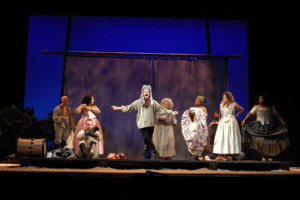Review: OUR COUNTRY'S GOOD, Sheffield Crucible

![]() Our Country's Good marks the third annual production from Ramps on the Moon, a consortium of six UK theatres and the Graeae theatre company, which specialises in creative approaches to inclusivity for deaf and disabled audiences and performers. Nottingham Playhouse has taken the lead in production for this particular show, which is directed by Fiona Buffini.
Our Country's Good marks the third annual production from Ramps on the Moon, a consortium of six UK theatres and the Graeae theatre company, which specialises in creative approaches to inclusivity for deaf and disabled audiences and performers. Nottingham Playhouse has taken the lead in production for this particular show, which is directed by Fiona Buffini.
The choice of Timberlake Wertenbaker's play, celebrating its 30th anniversary this year, is an overtly political one. The story takes place in a newly founded penal colony in Australia, and is centred on a lieutenant in the British military directing a production of The Recruiting Officer, with a cast drawn from the convict population.
The play deals with big themes - morality, place, community, hope and justice. It not only speaks to the experiences of the marginalised, but rallies us to the cause of the arts in a political landscape where they are currently under threat in terms of funding and education - and as Britain considers its place in the world, it's a helpful reminder of our troubled colonial past.
The cast is diverse in terms of age, ethnicity, gender and disability. Sixty per cent have disabilities, including several performers who are deaf. The production is staged to be inclusive not only of these performers, but also of audience members with different forms of disability, particularly hearing and sight disabilities.
Sign language is employed throughout - not in the form of a signer standing at the side of the stage, but embedded within, and central to, the whole production. Characters use sign language as gesture, making the delivery of the signing as much a part of the performance as any other movements or vocal expression.
Many actors speak and sign simultaneously, and when the remainder communicate solely through one medium, other members of the cast are signing or vocalising on their behalf. This is done in a really creative way, however, with performers remaining in character throughout - for example, one character eavesdropping on a spoken conversation will use sign language to relay what they've heard to their fellow characters.
In one very well-realised and moving scene, Harry (Gary Robson) converses with Duckling (Emily Rose Salter) entirely in sign. They bring out what the other is saying in their responses so the audience isn't alienated from the conversation, but this is done in a way that feels entirely believable emotionally rather than simply each performer repeating the other.
Salter is remarkable in her professional debut. She thoroughly embodies the character of Duckling and the different emotions this character experiences, particularly the difficulties she has in expressing exactly how she feels about Harry.
As well as the use of sign language, captioning is provided at the sides of the stage - and the subtitles were actually quite useful in places even for hearing audiences as the script contains many unfamiliar (to me anyway!) slang terms.
For audience members with sight problems, there are audio description headsets available, the programmes are available in both braille and large print, and in the foyer, there is a scale model of the set that can be touched, alongside fabric swatches of the different characters' clothing, all annotated in Braille, so that those who cannot see the costume and staging still can gain a sense of them.
Whilst audio description, sign language, captioning and other forms of inclusive support are becoming more widespread in British theatre, it is really refreshing to see work where these are embedded into the performance and directed and choreographed as much as any other part, rather than being an add-on.
The ensemble cast work really well together - and there isn't a weak link. Gbemisola Ikumelo offers a powerful interpretation of convict Liz Morden, whose storyline is perhaps the most dramatic of the piece. Alex Nowak, as Sideway and Reverend Johnson, has a real flair for comedy, as does Fifi Garfield as Dabby.
Sapphire Joy brings just the right amount of sweetness to the slightly more innocent Mary, without making her too saccharine, and Caroline Parker is rarely off the stage as both Meg Long and Will Dawes - not only acting her own lines, but, as Meg, taking on the mantle of being the character that often translates (whether through sign or through voice, depending on the situation) what the other characters are saying. She never comes out of character when doing the translation, instead embodying the role of the woman who sees herself as the spokesperson for the others.
If I have some criticisms of the play, these are fairly small: the opening few scenes are less immersive and a little slower than those that come once the play-within-a-play starts to be rehearsed; occasionally rushed delivery means some lines are lost.
The set is cleverly realised - wooden planks and canvas 'sails' that were once a ship become a stage, whilst bush and scrubland is well realised through judicious use of sand and small, but effective, pieces of shrubbery.
The inclusive, creative and immersive way this production has been put together emphasises the core messages of the play: learning from those who we might see as 'different'; challenging notions of power; and the passionate belief in the arts.
This is not a production that takes a pandering or tokenistic approach to accessibility. It's instead a powerful clarion call about the value of theatre - not just for the privileged few, but for all.
Our Country's Good is at the Crucible, Sheffield until 19 May and then at the Birmingham Repertory Theatre from 23 May to 2 June.
Add Your Comment
Videos
